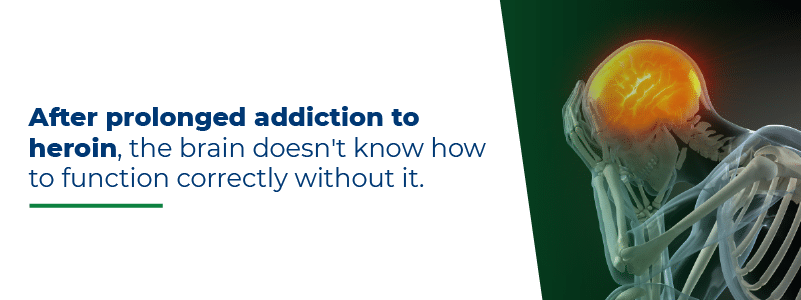Heroin is one of the most addictive drugs in the world, and it has made a resurgence as part of the opioid epidemic. We are not experiencing the first point in history that heroin has been a popular drug of use.
Short-Term Side Effects of Heroin
Heroin manufacturers originally developed it as a “wonder drug” meant to replace morphine. In the years following the Civil War, morphine addiction was a severe problem among soldiers on both sides. Morphine was readily available as a painkiller due to its undeniable efficacy, and doctors did not become aware of its addictive properties until the war was over. In the early days of heroin manufacturing, people marketed it as a non-addictive substitute for morphine.
Although the non-addictive element of this claim is false, the short-term effects of heroin are similar to those of morphine. As an opioid derived from morphine, heroin works by binding to mu-opioid receptors in the brain. Once attached, heroin triggers the release of dopamine. Dopamine is a neurotransmitter, which transfers information between neurons in the brain and is responsible for the pleasurable effects of heroin.
When a person takes heroin, the immediate dopamine flood provides instant gratification. The person will feel intense pleasure and feelings of well-being. Many people report a heaviness throughout the body paired with feelings of calm, even when in a frightening or dangerous situation. Heroin also works as an analgesic to reduce pain.
However, the initial feeling of pleasure also comes with short-term effects when people use heroin, including:
- Dry mouth
- Flushed skin
- Nausea and vomiting
- Extreme itchiness
One of the telltale signs someone is high on heroin is a condition known as being “on the nod,” which means they’re fluctuating between being conscious and semi-conscious, and they may be impossible to communicate with.
Developing Tolerance to Heroin
The first couple of times someone uses heroin, the short-term pleasure is the overriding experience. They may feel the brief burst of euphoria makes up for the itching and nausea, and decide to do it again. When used repeatedly, the effects of heroin will feel differently than the first use and the user may not feel the euphoria as strongly. This effect is due to tolerance.
The definition of tolerance is a state in which an organism no longer responds to a drug, and it requires a higher dose to achieve similar effects. With frequent use, heroin’s pleasurable effects quickly diminish, and people who misuse it find themselves having to take more and more to achieve the same type of euphoria. Someone may switch from smoking or snorting heroin to injecting it in higher concentrations.
Developing a tolerance to a drug does not always indicate an addiction. For example, if you get a tooth pulled and go from taking 250 mg of ibuprofen to 500 mg because of tolerance, you shouldn’t expect to get addicted. However, due to heroin’s potent nature and intense effects, the transition from tolerance to addiction is rapid and perilously easy.
Once someone starts building a tolerance to heroin — which can start happening within days of first use — their body craves the drug more and more. Sheer willpower is rarely enough to break the cycle. Seeking professional assistance is vital for individuals developing a tolerance to heroin to address the escalation of addiction.
Long-Term Effects of Heroin
From a physical standpoint, heroin is exceptionally damaging. Prolonged usage over weeks, months or years leads to medical complications that affect health and quality of life. If a person continues to use heroin, the long-term effects of heroin will reduce longevity. Below we have included 3 of the most common long-term effects of Heroin use.
Brain Damage From Heroin
Heroin is a depressant, or “downer,” meaning it reduces the functionality of the central nervous system (CNS). Along with changing the body’s response to pain, heroin affects heart rate and breathing. In the case of an overdose, depression of the CNS makes the body forget how to breathe without conscious thought. But even at non-overdose levels, heroin slows breathing enough to create a severe lack of oxygen.
Growing levels of opioid abuse have given rise to a new term: toxic brain injury. It refers to two types of brain injury that occur with oxygen deprivation. Hypoxic brain injury happens to a brain that doesn’t receive enough oxygen, and anoxic brain injury occurs when the brain doesn’t receive any oxygen at all.
Hypoxic brain injury occurs in many people addicted to heroin, forcing their brains to function on limited oxygen for an extended period. Anoxic brain injury usually occurs during an overdose, but not necessarily a fatal one. For example, someone may take too much heroin and pass out for a few seconds or a minute before waking up. During that time, they may stop breathing altogether, leading to an anoxic brain injury.
Organ Damage From Heroin

There are many ways opioids damage the body, but the concentration of heroin means it causes the damage much faster than other opioids. Here are some of the ways this powerful drug can harm your body.
- Large doses of heroin cause blood pressure to drop dramatically, and an overdose can result in heart failure.
- Intravenous heroin users are 300 times more likely to die from a heart infection called infectious endocarditis.
- Heroin can cause problems with heart rate or rhythm, called arrhythmia.
- Heroin can cause pulmonary edema, a condition in which the heart can’t effectively pump blood through the body.
- Heroin increases pressure in blood vessels and causes fluid to build up in the lungs, making it difficult to breathe normally.
- Heroin may cause significant damage to the liver.
It’s also important to note that heroin dealers often cut the drug with a variety of substances from powdered milk to chalk, or combine heroin with other drugs like fentanyl. The effects of additives to heroin can be highly unpredictable, and cutting the drug with a highly potent substance like fentanyl can easily lead to an accidental overdose.
Appearance Changes From Heroin
Most people are aware heroin can dramatically change a person’s appearance. Once someone has become addicted to heroin, they tend to neglect personal hygiene and nutrition. They may appear dirty and unhealthily thin, with skin issues from constant itching. If they inject the heroin intravenously, they will likely have visible track marks at the point of injection and be put at risk for infections.
Using heroin often results in dental problems like tooth decay and gum disease in part through persistent dry mouth. Heroin usage may also lead to a lack of proper nutrition, thereby causing the skin to appear dull and sallow, and eyes may appear sunken from weight loss. Overall, prolonged heroin use can cause people to appear run-down and generally unhealthy.
Heroin Misuse Symptoms
If a person is addicted to heroin, the signs might not be obvious at first. Obvious clues like red track marks can tell you if someone is using heroin, but they might hide these marks. In that case, you should be aware of other signs of heroin use. Certain symptoms can reliably indicate that someone is using opioids, including heroin which are:.
- Loss of interest in activities
- Increased isolation and social avoidance
- Mixing with new groups of people
- Poor hygiene practices
- Strange sleeping habits
- Fluctuating appetite
- Appearing overly energetic or very depressed
- Missing appointments and meetings
- Skipping work or school
- Experiencing financial hardship
- Cycling through erratic moods
Someone abusing heroin will seem to turn into a different person to their friends and family. Sudden changes in demeanor and habits can indicate an addiction, especially if accompanied by visible cues such as frequent itching or states resembling nodding off.

Heroin Withdrawal Symptoms
When someone stops using heroin, they go through the process of withdrawal. After prolonged addiction to heroin, the brain doesn’t know how to function correctly without it. If a person quits heroin, the brain goes into panic mode and produces an array of extremely unpleasant symptoms as it adjusts to the lack of the drug.
The milder symptoms include:
- Nausea and abdominal cramps
- Excessive tearing and runny nose
- Frequent yawning
- Sweats and chills
On the more acute end of the spectrum, people may experience these symptoms:
- Vomiting and diarrhea
- Extreme agitation or anxiety
- Restlessness
- Trembling and goosebumps
- Fatigue
- Trouble concentrating
In the most severe cases, someone may experience hypertension, rapid heartbeat and difficulty breathing. The severity of heroin withdrawal symptoms varies based on several factors. The longer someone has been abusing heroin, the more intense their withdrawal experience will be. The dosage taken matters as well. Someone who has been using heroin once a day for six months will likely have fewer symptoms of less severity than someone who used heroin twice a day for a year.
Heroin withdrawal is not usually life-threatening, but it creates an extreme craving for heroin. The symptoms often combine to feel like a terrible flu, and the discomfort can be bad enough to cause an immediate relapse. If someone has an underlying condition like depression or anxiety, withdrawals can feel significantly worse and even lead to suicidal ideation.
In most cases, withdrawal begins within 12 hours after the last use of heroin. The milder symptoms appear first, and the more severe symptoms usually appear within the first 24 to 48 hours. The third and fourth days of withdrawal are often the worst in terms of pain, nausea, sweating and shivers. By the end of the first week, the worst of withdrawal is usually over.
Recovery From a Heroin Addiction
Heroin addiction can be terrifying and isolating, but there are effective treatments that can help people begin a successful recovery. The National Institute on Drug Abuse (NIDA) recommends a two-pronged approach consisting of behavioral and pharmacological treatment to help restore the brain to a healthier state.
Behavioral therapies are highly versatile and can take place in both outpatient and residential settings. A variety of techniques can be effective, such as cognitive-behavioral therapy or group therapy. The goals of therapy are to give people emotional support, help them modify thoughts and behavior toward drugs and learn new methods for coping with the difficulties and stress that contributed to the addiction in the first place.
The other component of an effective program is medication-assisted treatment. In this type of program, patients receive drugs that block the worst symptoms of withdrawal. Patients usually take either buprenorphine or methadone, medications that engage opioid receptors just enough that the brain doesn’t rush into withdrawal. Instead, taking these medicines allows patients to feel healthy and stable enough to participate in behavioral therapy and go about their daily lives.
Not all people respond the same to a single type of treatment plan, so it’s vital to choose a program that takes your needs into account when designing your recovery plan.
Start Your Recovery Journey With MedMark
Heroin addiction is a severe health condition, but it doesn’t have to be permanent or destroy lives. With the right treatment program and support network, you or someone you love can make a successful recovery. MedMark Treatment Centers offer compassionate treatment based on the proven efficacy of medication-assisted treatment and an array of behavioral therapies.
Our treatments are medically supervised and tailored to individual needs. We offer individual and group counseling, resource referral, addiction education and discharge planning services, making MedMark a comprehensive treatment option for anyone struggling with heroin addiction.
The sooner you choose to get professional help for heroin addiction, the sooner you can halt the damage and start the healing process. If you’re ready to take the next step and get more information on heroin addiction treatment, call MedMark at 866-840-6658 to reach a clinic near to you or get in touch through our contact form.






